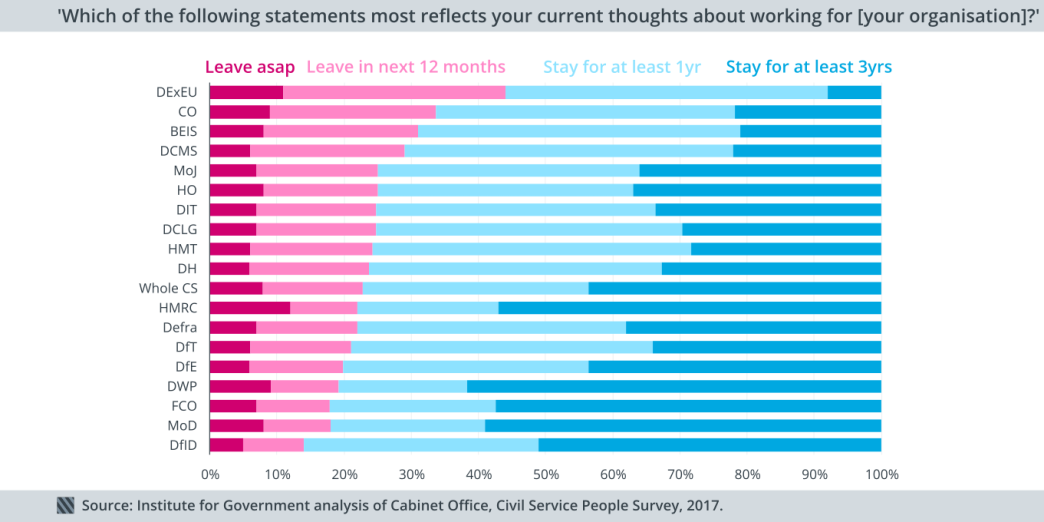Staff turnover in the civil service is a constant problem. But we should be particularly concerned about the rate of churn in the department managing Brexit, argues Jill Rutter.
Churn in the civil service – when people move between roles and departments or leave – is internally disruptive and makes it hard to manage external relationships. Crucially, churn reduces productivity.
The National Audit Office recently found that churn at the Department for Exiting the EU (DExEU) is running at 9% a quarter. The civil service average is 9% a year. Anecdotal evidence suggests the internal churn - movement between roles and changing internal structures — inside DExEU is also high. This churn makes it hard to build up institutional knowledge and memory.
Churn happens despite DExEU staff being relatively happy, according to the civil service People Survey. This could be explained to some extent by the age profile. High turnover is a feature of young departments and the median age at DExEU is just 31 (similar to the Treasury). DExEU also has a very high proportion of Fast Stream civil servants, whose career development assumes they move every six months.
Nonetheless this degree of churn in the department at the forefront of coordinating the complicated task of leaving the EU should cause concern both within and outside the department.
Instability at DExEU looks set to continue as we approach a critical year for Brexit
Since it was set up, DExEU has grown from a staff of under 100 to over 600. But as it was adding staff it was also losing them, mainly to posts elsewhere in the civil service.
In 2018, DExEU faces a massive workload: passing the EU Withdrawal Bill; drafting the withdrawal agreement and getting transition legislation onto the statute book; dealing with the vast raft of follow-up secondary legislation; coordinating implementation and contingency planning across Whitehall and managing stakeholder interactions.
All of this while supporting the second phase of Brexit negotiations.
DExEU can’t afford to lose its recently assembled expertise
But instability looks sets to continue. The most recent civil service People Survey asked respondents about their future, and 44% of DExEU civil servants said they plan to leave in the next year. That means that through a crucial year for Brexit, staff will be hunting around for jobs, taking time off for interviews and, in some cases, mentally checking out from their current role well before their official leaving date.

The Government needs to be clearer on how long the department itself may last
Hardly any DExEU staff expect to still be there in three years. But it is more surprising that people expect to be there even that long, considering DExEU was set up as a short-term vehicle to deliver the UK’s exit from the EU. Staff are either on secondment from other government departments, or if recruited directly by DExEU, on two year contracts.
It is becoming increasingly clear that Brexit will not be done and dusted in two years. So, whatever the decision on DExEU’s future – and it has already been decapitated with the move of Olly Robbins — the civil service will still need people with experience managing the Brexit detail for some time to come.
The civil service needs to offer incentives to people to stay in critical posts
The civil service needs to offer longer or permanent contracts for the good performers among the recent recruits to DExEU.
But that in itself will not deal with churn. The civil service is notoriously bad at keeping people in the same post, however critical that is to project success. For the 2012 Olympics, staff who stayed until the opening ceremony were often warned that it was bad for their career.
But Brexit is not the Olympics – it is more complicated and more important. The Government cannot rely on enthusiasm to keep people in post. It needs to develop and deploy incentives to keep people in essential roles for long enough to deliver – even if that means suspending the anarchic internal civil service job market for the next couple of years and paying some decent completion bonuses.
- Topic
- Brexit